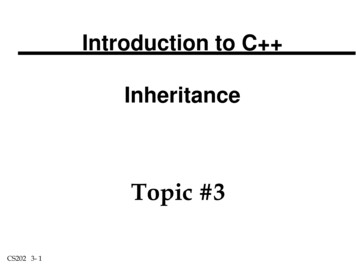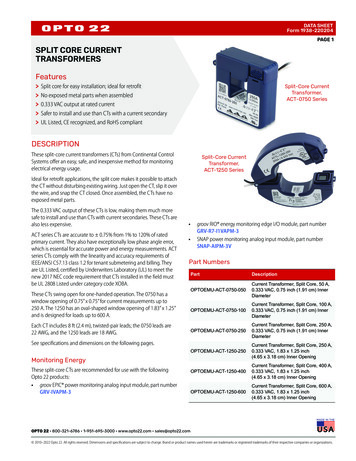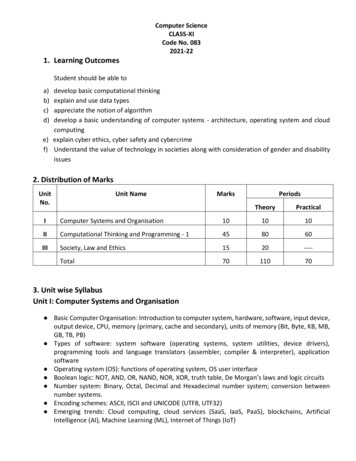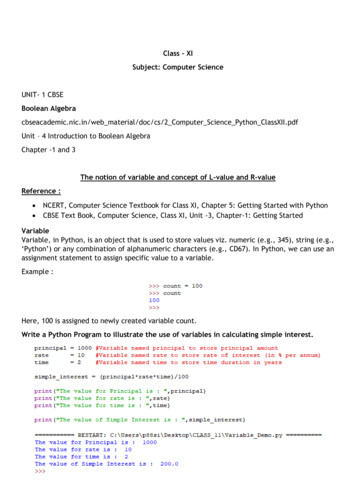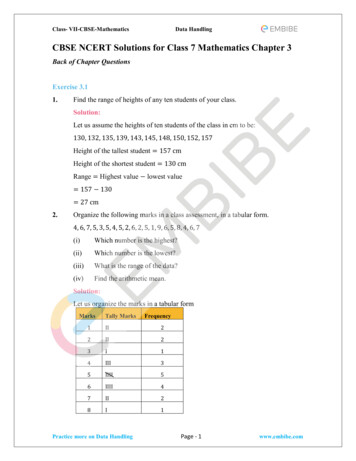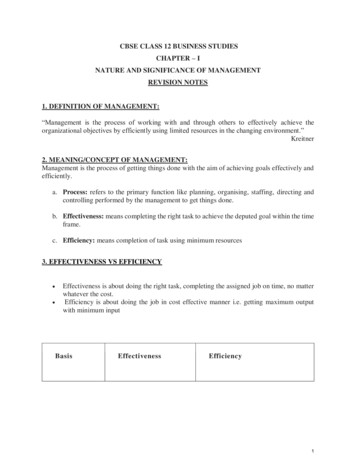
Transcription
CBSE CLASS 12 BUSINESS STUDIESCHAPTER – INATURE AND SIGNIFICANCE OF MANAGEMENTREVISION NOTES1. DEFINITION OF MANAGEMENT:“Management is the process of working with and through others to effectively achieve theorganizational objectives by efficiently using limited resources in the changing environment.”Kreitner2. MEANING/CONCEPT OF MANAGEMENT:Management is the process of getting things done with the aim of achieving goals effectively andefficiently.a. Process: refers to the primary function like planning, organising, staffing, directing andcontrolling performed by the management to get things done.b. Effectiveness: means completing the right task to achieve the deputed goal within the timeframe.c. Efficiency: means completion of task using minimum resources3. EFFECTIVENESS VS EFFICIENCY Effectiveness is about doing the right task, completing the assigned job on time, no matterwhatever the cost.Efficiency is about doing the job in cost effective manner i.e. getting maximum outputwith minimum inputBasisEffectivenessEfficiency1
MeaningIt refers to thecompletion of workon time.In simplewordsIt simply meansdoing right thingsIt simply means doing thingscorrectly in a faster and costefficient manner.ObjectiveTo achieve endresults on timePerforming task with leastwastage of time andeffort(cost)MainFocusIs on timeIs on costIt refers to the completion ofwork correctively withminimum cost and maximumprofit4. CHARACTERISTICS OF MANAGEMENT:2
I.Management is a goal-oriented process: An organisation has a set of simple and clearlystated goals, which are the basic reason for its existence. Management unites the efforts ofthe individuals in the organisation towards achieving these goals.II.Management is all pervasive: Management is common to all organisations whethereconomic, social or political. For e.g. management is applicable for a governmentcompany, school, private company or a NGO.III.Management is multidimensional:Management is a complex activity that has three main dimensions:(a) Management of work(b) Management by people(c) Management by operationIV.Management is a continuous process: It is a series of continuous, composite, but separatefunctions, performed by all managers all the time.V.Management is a group activity: All the individuals in the organisation contributestowards achieving the goals set by the organization.VI.Management is a dynamic function: It has to adapt itself to its changing externalenvironment, which consists of various social, economic and political factors.VII.Management is an intangible force: It cannot be seen but its presence can be felt fromthe way organization functions.5. MANAGEMENT OBJECTIVES:3
Organisational Objectives: Organizational Objectives can be divided into Survival (Earningenough revenues to cover cost); Profit (To cover cost and risk); and Growth (To improve itsfuture prospects).(a) Survival: Earning enough revenues to cover cost. Management by taking positivedecisions with regard to different business activities ensures survival of business for longterm.(b) Profitability: Earning adequate profit in order to survive and grow. Profits provide a vitalincentive for the continued successful operation of the enterprise(c) Growth: Growth indicates how well it exploits the potential opportunities. Growth of abusiness can be measured in terms of sales volume increase, number of employees,products etc.Social Objectives:Is to provide quality products at reasonable rates and generating employment opportunities fordisadvantaged sections of society. To provide basic amenities like schools and crèches toemployees and by using environmental friendly methods of production.Personal Objectives:Includes meeting the financial needs like competitive salaries and perks and Social and safetyneeds of the employee like basic amenities, peer recognition etc.6. IMPORTANCE OF MANAGEMENT4
1. Management helps in achieving group goals: Management creates teams and coordinateswith individuals to achieve individual goals along with organizational goals2. Increases efficiency: Management increases efficiency by using resources in the best possiblemanner to reduce cost and increase productivity.3. Creates dynamic organization: Management helps the employees overcome their resistanceto change and adapt as per changing situation to ensure its survival, growth and its competitiveedge.4. Achieving personal objectives: Through motivation and leadership management helps theindividuals in achieving personal goals while working towards organizational objective.5. Development of society: Management helps in the development of society by producing goodquality products, creating employment opportunities and adopting new technologies.7. NATURE OF MANAGEMENT1. Management as an ArtArt refers to skillful and personal application of existing knowledge acquired through study,observation and experience. The features of art are as follows:a. Existence of theoretical knowledge: In every art, Systematic and organizedstudy material is available to acquire theoretical knowledge and experts in therespective fields apply these principles to their respective art forms.b. Personalized application: The use of basic knowledge differs from person toperson and thus, art is a very personalized concept.5
c. Based on practice and creativity: Art involves creativity and practice of theexperts. For e.g. the music created by musicians are different though the musicalnotes used are the same.Every manager has his own unique style of managing things and people. He/she uses hiscreativity in applying management techniques and his skills improve with regular application.Since all the features of art are present in management. So it can called an art.2. Management as a ScienceScience is a systematized body of knowledge that is based on general truths, which can be testedanywhere, anytime. The features of Science are as follows:a. Systematized body of knowledge: Science has a systematized body of knowledge basedon cause and effect relationship.b. Principles based on experiments and observation: Scientific principles are developedthrough experiments and observation.c. Universal validity: Scientific principles have universal validity and application.Management has systematic body of knowledge and its principles are developed over a period oftime based on repeated experiments & observations which are universally applicable but theyhave to be modified according to given situation.As the principles of management are not as exact as the principles of pure science, so it maybe called-an inexact science. The prominence of human factor in the management makes it aSocial Science.3. Management as ProfessionProfession means an occupation for which specialized knowledge and skills are required andentry is restricted. The main features of profession are as follows:a. Well-defined body of Knowledge: is complete set of principles, concepts, terms andactivities that make up a professional domain.b. Restricted Entry: The entry in every profession is restricted through examination orthrough educational degree.c. Professional Associations: All professions are affiliated to a professional association,which regulates entry and frames code of conduct relating to the profession. Eg. IMA, ICAId. Ethical Code of Conduct: All professions are bound by a code of conduct, which guidesthe behavior of its members.e. Service Motive: The main aim of a profession is to serve its clients.Management does not fulfill all the features of a profession and thus it is not a full-fledgedprofession like doctor, lawyer, etc.6
8. LEVELS OF MANAGEMENTTop Management: Designations and FunctionsComprises of CEO, Board of Directors, MD, GM, VP. Main task is conceptualizing oforganizational goal, policy and strategy formulation and organising, controlling and monitoringactivities and resources. Controlling the work performance of individuals and approving Budgets.Middle Management : Designations and FunctionsComprises of Departmental, Sub‐Departmental and Divisional heads, its main task is execution ofplans, policies framed by the top level management and preparing organisational set up &appointing employees and issuing instructions and motivating employees. Ensuringinterdepartmental cooperation as well.Supervisory and operational Level : Designations and FunctionsConsists of Foremen and supervisor etc. Main task is to ensure actual implementation of thepolicies as per directions of top and middle level managers and also to Bring workers’ grievancesbefore the management & maintain discipline among the workers.9. FUNCTIONS OF MANAGEMENT:7
I.Planning : Setting objectives and targets and formulating an action plan. It bridges thegap between where we are and where we want to reach.II.Organising: Involves assigning duties, grouping tasks, establishing authority andresponsibility relationships and allocating the resources required to perform a specificplan.III.Staffing: Finding and placing the right person for the right job at the right time. Itinvolves recruitment, selection, placement, induction and development of employees.IV.Directing: Refers to leading, influencing, motivating the staff chosen to perform theassigned task efficiently and effectively.V.Controlling: Refers to monitoring organizational activities towards the attainment oforganizational goals. It involves setting standards measuring current performance,comparing with the standards, and taking corrective action for any deviations.10. COORDINATIONCoordination is the force which synchronizes all the functions of management and activities ofdifferent departments. Lack of coordination results in overlapping, duplication, delays and chaos.It is concerned with all the three levels of management as if all the levels of management arelooked together, they become a group and as in the case of every group, they also requirecoordination among themselves. Coordination is implicit and inherent in all functions of anorganisation.8
IMPORTANCE OF COORDINATION:The reasons that bring out the importance or the necessity for coordination areI.Growth in the Size: An organisations growth results in the increase in the number ofpeople employed with varied individual aspirations and culture. So it is important toharmonize individual goal with the organizational goals through coordination.II.Functional Differentiation: All the departments and divisions may have their own,objective, policies and their own style of working. However all departments andindividuals are interdependent and cannot work in isolation. Thus, coordination isnecessary for linking the activities of various departments.III.Specialization: Mostly specialists have a feeling of superiority and prioritize their zone ofactivities. Coordination seeks to sequence and integrate all the specialists’ activities into awholesome effort.10
Management is the process of getting things done with the aim of achieving goals effectively and efficiently. a. Process: refers to the primary function like planning, organising, staffing, directing and controlling performed

